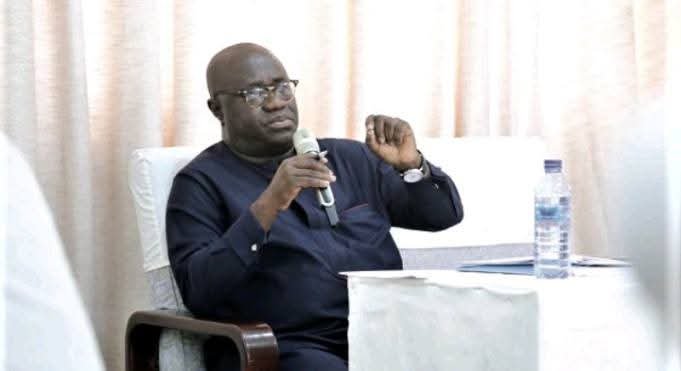News
Mr President, rescind this policy before Ghana is destroyed– Prof. Aning’s plea over galamsey directive

Security expert Professor Kwasi Aning has criticised government’s new policy in handling of foreign nationals involved in galamsey, which he said could ultimately destroy the country.
Speaking on Joy News’ PM Express on Tuesday, April 8, he described the Interior Minister’s decision as “populist,” “unthoughtful,” and “a disgrace,” arguing that it fails to address the root causes of illegal mining and sends a dangerous message to transnational criminal elements.
“I have absolutely no sympathy,” he said.
“I detest being an independent Ghanaian in Kwame Nkrumah’s Ghana and being treated like a second-class citizen. And let me appeal to the President directly; Mr. President, rescind this policy before this country is destroyed.”
The policy in question, announced by Interior Minister Muntaka Mubarak, directs the Inspector General of Police to immediately transfer all regional, divisional, and district police commanders who have served for long periods in mining areas without showing significant progress in the fight against illegal mining.
In a further controversial move, the Minister said that foreign nationals caught engaging in galamsey would be deported without prosecution.
Prof. Aning condemned the deportation approach as not only ineffective but deeply damaging to Ghana’s sovereignty and justice system.
“This is a policy that will serve as an attraction for even worse criminals to come,” he warned.
“They know we don’t have the capacity to prosecute them. They know we don’t have the political will to do what is right for the people of this country.”
He challenged the President to make his final term count, stating that the current approach falls drastically short of the promises made in the State of the Nation Address.
“This is your legacy term—let it matter and let it count,” he implored. “Your minister has demonstrated an unwillingness and a reluctance to hold the bull by the horns and resolve this crisis.”
While he acknowledged that some changes in police deployment could be beneficial, he stressed that arbitrary transfers without resources and proper accountability structures would be meaningless.
“I think it’s useful that we give the police officers performance indicators,” Prof. Aning said.
“But we need to give them the resources, Your Excellency, so that the three months can be tested and their results checked.”
He didn’t hold back on what he sees as the broader implications of the policy.
“We cannot have a two-tier law. We cannot have a two-tier implementation process. The manner in which this has been presented to the Republic of Ghana is shameful. It is not thought through. It is populist, and it is a disgrace.”
Prof. Aning concluded with a passionate plea to President Mahama to stay true to his earlier commitments to the environment and national integrity.
“Let this be your legacy term by reclaiming the environment, as you promised the people of Ghana in your State of the Nation Address. We cannot afford more half-measures,” he concluded.
Source: Myjoyonline.com
News
Prioritise affordable treatment of sickle cell treatment —Health Expert

Health experts have urged Ghana to prioritise affordable and accessible treatment for sickle cell disease (SCD) as advanced, but costly curative therapies remain out of reach.
SCD, an inherited blood disorder, affects about three in every 100 newborns in Ghana.
Globally, around 1,000 babies are born with the condition daily, with three-quarters in sub-Saharan Africa.
The disease causes severe complications including chronic pain, anaemia, infections, strokes and organ damage, often leading to shortened life expectancy.
In recent years, gene therapy has been developed as a potential cure.
However, its cost—running into millions of dollars per patient—makes it financially and technically inaccessible in Ghana.
According to Dr Lawrence Osei-Tutu, a Sickle Cell and Childhood Cancer Expert at the Komfo Anokye Teaching Hospital, “the country must instead focus on practical, lower-cost interventions such as hydroxyurea”, a decades-old cancer drug proven to reduce painful episodes, hospitalisation and life- threatening complications in SCD patients”.
Taken orally, the medicine improves red blood cell function and is considered safe and effective.
“Hydroxyurea therapy is as good as the cure and a low-hanging fruit to pluck, we must bring a cure to our sickle cell warriors, but do so sustainably.” he urged.
In a chat with The Spectator here, he said to create awareness on the disease, the expert noted that despite its benefits, “hydroxyurea is not widely accessible in Ghana.”
Stressing that, “many patients either cannot afford it or struggle with irregular supply through the health system.”
Moreover, he argued that scaling up access would provide immediate relief while the country builds the infrastructure, trains specialists and secures funding needed to support curative therapies in the future.
With an estimated 15,000 babies born with sickle cell disease annually in Ghana, Dr Osei Tutu cautioned that “failure to improve access to effective treatment will leave many patients vulnerable to preventable complications and early death.”
From Kingsley E. Hope, Kumasi
Join our WhatsApp Channel now!
https://whatsapp.com/channel/0029VbBElzjInlqHhl1aTU27
Hot!
Let’s reintroduce Cultural Studies to complement educational reforms — Tourism Minister

Madam Abla Dzifa Gomashie, the Minister of Tourism, Culture and Creative Arts, has emphasised the importance of reintroducing Cultural Studies in schools as part of Ghana’s broader educational reform agenda.
She said Cultural Studies would complement existing efforts to reposition Science, Technology, Engineering and Mathematics (STEM) and Technical Vocational Education and Training (TVET) to promote digital literacy and expand Creative Arts education.
Speaking at the 2025 Homowo Festival of the people of Ningo-Prampram, held on the theme: “Education: The Best Legacy for our Children,” Madam Gomashie said cultural education was critical to national identity and development.
She noted that the festival’s theme aligned with the Government’s vision to transform education in Ghana and encouraged the youth to embrace it not only as a means of personal development but also as a way of preserving traditional values.
These values, including patience, wisdom, and hard work, were at the core of the Homowo celebration, the Minister said.
“Cultural festivals like Homowo are vital instruments for strengthening cultural identity, preserving historical memory, and fostering national unity. Additionally, festivals serve as platforms for educating the youth through storytelling, music, dance, and other traditional practices, while also providing opportunities for community engagement.”
Madam Gomashie highlighted the strong foundation that Ghana’s tourism was built on, which included culture, traditions, and the creative industry, collectively contributing to over GH¢4.8 billion to the economy.
“Festivals give tourists reasons to visit our country. Therefore, with the right infrastructure and the development of all the domains, the sector can do more than what has been recorded,” she added.
Mr Sam Nartey George, the Member of Parliament for Ningo-Prampram and Minister of Communication, Digital Technology and Innovation, commended the community for their vibrant participation in the festival. He announced plans for the construction of a new nursing training school in Ningo, aimed at expanding access to healthcare education in the area.
Nene Osroagbo Djangmah XII, Paramount Chief of Great Ningo Traditional Area; King Dr Tackie Teiko Tsuru II, Ga Mantse; Nene Tetteh Wakah III, Paramount Chief of the Prampram Traditional Area; Prof. Odaifio Welentsi III, Paramount Chief of the Nungua Traditional Area; Naana Dugbakuwor Dugba II, Paramount Queen Mother of Great Ningo; and Mr. Elvis Afriyie Ankrah, Special Envoy on Religion and Inter-Faith Affairs, who represented the Chief of Staff, were among dignitaries at the festival. -GNA














